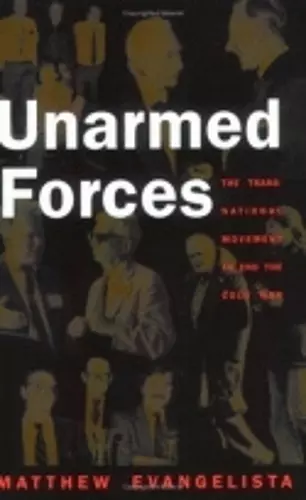Unarmed Forces
The Transnational Movement to End the Cold War
Format:Paperback
Publisher:Cornell University Press
Published:19th Mar '02
Currently unavailable, and unfortunately no date known when it will be back
This paperback is available in another edition too:
- Hardback£47.00(9780801436284)

Winner of the Marshall Shulman Book Prize, awarded by the American Association for the Advancement of Slavic Studies, and the Jervis-Schroeder Prize, given by the American Political Science Association.
Throughout the Cold War, people worldwide feared that the U.S. and Soviet governments could not prevent a nuclear showdown. Citizens from both East-bloc and Western countries, among them prominent scientists and physicians, formed networks to promote...
Throughout the Cold War, people worldwide feared that the U.S. and Soviet governments could not prevent a nuclear showdown. Citizens from both East-bloc and Western countries, among them prominent scientists and physicians, formed networks to promote ideas and policies that would lessen this danger. Two of their organizations—the Pugwash movement and the International Physicians for the Prevention of Nuclear War—won Nobel Peace Prizes. Still, many observers believe that their influence was negligible and that the Reagan administration deserves sole credit for ending the Cold War. The first book to explore the impact these activists had on the Soviet side of the Iron Curtain, Unarmed Forces demonstrates the importance of their efforts on behalf of arms control and disarmament.
Matthew Evangelista examines the work of transnational peace movements throughout the Khrushchev, Brezhnev, and Gorbachev eras and into the first years of Boris Yeltsin's leadership. Drawing on extensive research in Russian archives and on interviews with Russian and Western activists and policymakers, he investigates the sources of Soviet policy on nuclear testing, strategic defense, and conventional forces. Evangelista concludes that transnational actors at times played a crucial role in influencing Soviet policy—specifically in encouraging moderate as opposed to hard-line responses—for they supplied both information and ideas to that closed society.
Evangelista's findings challenge widely accepted views about the peaceful resolution of the Cold War. By revealing the connection between a state's domestic structure and its susceptibility to the influence of transnational groups, Unarmed Forces will also stimulate thinking about the broader issue of how government policy is shaped.
So if the mighty steel of US military strength did not tame the Russian bear, what did? Matthew Evangelista's answer to this question should pique the interest of argumentation scholars.... Evangelista's findings raise serious questions about realpolitik models of international relations that explain US Cold War victory over the Soviet Union in terms of one mammoth billiard ball smashing into and destroying its more fragile counterpart. His impressive empirical research illustrates how threats, policies, and norms were constructed and deconstructed by argumentation conducted in transnational channels of communication. If the significance of this finding for students of argumentation is not already apparent, it becomes obvious in Evangelista's final case study, which examines the influence of transnational activism on post-Soviet policy.
* Argumentation and Advocacy *This is a highly detailed but readable book, punctuated by photographs and entertaining chapter captions.... Evangelista's book makes valuable reading for scholars interested in expanding their views about the end of the Cold War, as well as for those who will be inspired by the fact that transnational citizen influence could bring some amount of pressure to bear on one of the most brutal and tyrannical regimes of the twentieth century.
-- Valerie Sperling, Clark University * Journal of Cold War Studies *At the core of this book lies a thesis unsettling for conventional explanations of the cold war and its end: in terms of its professed aims of moderating Soviet conduct, U.S. policy toward the Soviet Union was a resounding failure.... At one level, this book functions as a massive indictment, sotto voce, of the U.S. security establishment, its government officials, allied academics, and media publicists. Evangelista cuts through their bluff, bluster, and baloney to reveal an astounding intellectual bankruptcy.... This is a powerful, path-breaking study.
-- Michael Urban * Political Science Quarterly *Matthew Evangelista's Unarmed Forces fills a key gap in Cold War historiography and international relations theory by examining how transnational actors (TNAs) affected Soviet and Russian security policies from the 1950s to the mid-1990s.... The book's most important theoretical contribution is its demonstration that, contrary to standard models, TNAs can affect security issues.... The book's remarkable empirical detail and clear theoretical argument will be invaluable for Cold War historians, arms control experts, international relations theorists, and aspiring transnational actors.
-- Andrew Bennett, Georgetown University * Slavic Review *This book will help educate those who think the course of the Cold War and its end—or for that matter any important dimension of international politics—were driven only by governments, national leaders, and vast political forces.... This is a smart, well-argued, and unassuming book.
* Foreign Affairs *To his credit, Matthew Evangelista has developed in Unarmed Forces a powerful argument that transnational movements of the past half century were able to influence the policies and decisions of a rigid, totalitarian USSR and a bureaucratized US foreign policy establishment.... He carefully marshals his arguments and provides a wealth of source material as an important dividend for the interested reader.
-- Herbert L. Abrams, Stanford University * Physics Tod- Winner of Winner of the 2000 Marshall Shulman Book Prize (Am.
ISBN: 9780801487842
Dimensions: 235mm x 155mm x 24mm
Weight: 907g
416 pages